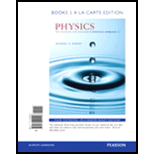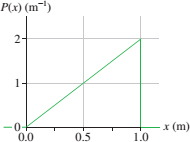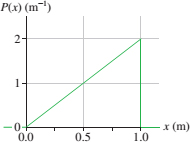
(a)
location where photon is more likely to be detected?
Answer to Problem 1CQ
Solution: Photon is more likely to be found at
Explanation of Solution
Given:
Figure of probability density of photons on the x-axis

Figure.1
It is clear from the figure, that the probability of finding a particle at
Conclusion:
Photon is more likely to be found at
(b)
expected number of photons in a 1 mm wide interval at
Answer to Problem 1CQ
Solution: expected number of photons in a 1 mm wide interval at
Explanation of Solution
Given:
Figure of probability density of photons on the x-axis

Figure.1
Calculation:
It’s clear from the figure that, probability of finding photon at
The area of curve at x=1 mm is
The expected number of photon that can be detected in the area is
Conclusion:
Expected number of photons in a 1 mm wide interval at
Want to see more full solutions like this?
Chapter 39 Solutions
Physics for Scientists and Engineers: A Strategic Approach with Modern Physics, Books a la Carte Edition; Student Workbook for Physics for Scientists ... eText -- ValuePack Access Card (4th Edition)
- Fractions 1. Covert 5/7 to a decimal 2. 5/7 x 3/8 3. 2/5 divided 4/9 4. covert 37/ 19 to a decimalarrow_forwardthis is an exam past paper question that i need help with becuase i am reviewing not a graded assignmentarrow_forwardsunny (1) -13- end. One box contains nothing inside; one has a piece of resistance wire between the terminals You are provided with three sealed identical matchboxes labelled A, B and C, with terminals at each and the other, a semi-conductor diode. Plan and design an experiment to identify the contents of each box. You are provided with the following elements for your apparatus: Ammeter Low voltage power supply Connecting wires Labelled circuit diagram Draw a well-labelled circuit diagram to show how you would connect the apparatus listed above to each matchbox. (3 maarrow_forward
- RAD127 Radiographic Equipment and Computers SI Units in Radiography Ch. 1 & 2 Instructions: Provide the units for each of the following in full and short forms 1. Mass - kg, 9 or (1b)) ・ 2. Energy, Work - W = FD,J 3. Air kerma -(Gya) 4. Absorbed Dose- 5. Effective Dose J/kg (94+) jlkg J/kg, Sv 6. Radioactivity - 5-1, Bq 7. Weight 8. Time 9. Force 10. Power B9 wt, wt-mg, N -(s) F= ma, N, OR 1b. (JIS), P= work It = Fdlt, Jarrow_forwardanswer 1-8arrow_forward1 . Solve the equation 2/7=y/3 for y. 2. Solve the equation x/9=2/6 for x. 3. Solve the equation z + 4 = 10 This is algebra and the equation is fraction.arrow_forward
- two satellites are in circular orbits around the Earth. Satellite A is at an altitude equal to the Earth's radius, while satellite B is at an altitude equal to twice the Earth's radius. What is the ratio of their periods, Tb/Taarrow_forwardFresnel lens: You would like to design a 25 mm diameter blazed Fresnel zone plate with a first-order power of +1.5 diopters. What is the lithography requirement (resolution required) for making this lens that is designed for 550 nm? Express your answer in units of μm to one decimal point. Fresnel lens: What would the power of the first diffracted order of this lens be at wavelength of 400 nm? Express your answer in diopters to one decimal point. Eye: A person with myopic eyes has a far point of 15 cm. What power contact lenses does she need to correct her version to a standard far point at infinity? Give your answer in diopter to one decimal point.arrow_forwardParaxial design of a field flattener. Imagine your optical system has Petzal curvature of the field with radius p. In Module 1 of Course 1, a homework problem asked you to derive the paraxial focus shift along the axis when a slab of glass was inserted in a converging cone of rays. Find or re-derive that result, then use it to calculate the paraxial radius of curvature of a field flattener of refractive index n that will correct the observed Petzval. Assume that the side of the flattener facing the image plane is plano. What is the required radius of the plano-convex field flattener? (p written as rho )arrow_forward
- 3.37(a) Five free electrons exist in a three-dimensional infinite potential well with all three widths equal to \( a = 12 \, \text{Å} \). Determine the Fermi energy level at \( T = 0 \, \text{K} \). (b) Repeat part (a) for 13 electrons. Book: Semiconductor Physics and Devices 4th ed, NeamanChapter-3Please expert answer only. don't give gpt-generated answers, & please clear the concept of quantum states for determining nx, ny, nz to determine E, as I don't have much idea about that topic.arrow_forward3.37(a) Five free electrons exist in a three-dimensional infinite potential well with all three widths equal to \( a = 12 \, \text{Å} \). Determine the Fermi energy level at \( T = 0 \, \text{K} \). (b) Repeat part (a) for 13 electrons. Book: Semiconductor Physics and Devices 4th ed, NeamanChapter-3Please expert answer only. don't give gpt-generated answers, & please clear the concept of quantum states for determining nx, ny, nz to determine E, as I don't have much idea about that topic.arrow_forwardNo chatgpt pls will upvotearrow_forward
 College PhysicsPhysicsISBN:9781305952300Author:Raymond A. Serway, Chris VuillePublisher:Cengage Learning
College PhysicsPhysicsISBN:9781305952300Author:Raymond A. Serway, Chris VuillePublisher:Cengage Learning University Physics (14th Edition)PhysicsISBN:9780133969290Author:Hugh D. Young, Roger A. FreedmanPublisher:PEARSON
University Physics (14th Edition)PhysicsISBN:9780133969290Author:Hugh D. Young, Roger A. FreedmanPublisher:PEARSON Introduction To Quantum MechanicsPhysicsISBN:9781107189638Author:Griffiths, David J., Schroeter, Darrell F.Publisher:Cambridge University Press
Introduction To Quantum MechanicsPhysicsISBN:9781107189638Author:Griffiths, David J., Schroeter, Darrell F.Publisher:Cambridge University Press Physics for Scientists and EngineersPhysicsISBN:9781337553278Author:Raymond A. Serway, John W. JewettPublisher:Cengage Learning
Physics for Scientists and EngineersPhysicsISBN:9781337553278Author:Raymond A. Serway, John W. JewettPublisher:Cengage Learning Lecture- Tutorials for Introductory AstronomyPhysicsISBN:9780321820464Author:Edward E. Prather, Tim P. Slater, Jeff P. Adams, Gina BrissendenPublisher:Addison-Wesley
Lecture- Tutorials for Introductory AstronomyPhysicsISBN:9780321820464Author:Edward E. Prather, Tim P. Slater, Jeff P. Adams, Gina BrissendenPublisher:Addison-Wesley College Physics: A Strategic Approach (4th Editio...PhysicsISBN:9780134609034Author:Randall D. Knight (Professor Emeritus), Brian Jones, Stuart FieldPublisher:PEARSON
College Physics: A Strategic Approach (4th Editio...PhysicsISBN:9780134609034Author:Randall D. Knight (Professor Emeritus), Brian Jones, Stuart FieldPublisher:PEARSON





